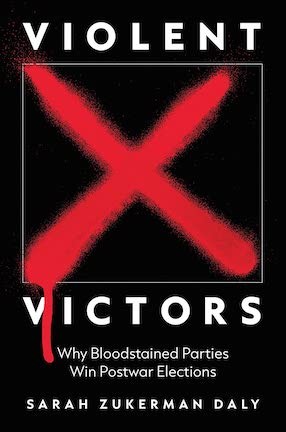Why Do Belligerent Actors Win Free Elections?
In her book, "Violent Victors," political scientist Sarah Z. Daly delves into why aggressors in civil conflicts are rewarded at the ballot box.

Regions around the globe are often marred by brutal internal armed conflicts. In some instances, after the bloodshed ends, democratic elections take place. It might be assumed that the parties connected to the violence have little chance of winning the vote in these free elections.
In "Violent Victors: Why Bloodstained Parties Win Elections," Sarah Z. Daly, associate professor of political science, upends the notion that citizens from war-torn regions prefer candidates who are not connected to the bloodshed. Indeed, Daly found that victims of the violence often freely vote for the perpetrators of the brutalities. She conducted years of fieldwork in Central America and Colombia to understand the mindset of the terrorized inhabitants and what factors make it possible for belligerent actors to win elections.
Columbia News caught up with Daly to find out what inspired her to study war-torn regions of Latin America, why victims of violence elect those who terrorized them, and what dead philosophers she would happily spar with at the dinner table.
What led you to study Latin America and armed conflicts in that region?
This is a long story! Here’s an abbreviated version. When I was 17, I lived in San Ramón, Ecuador, for eight months, a town located in a remote region about seven hours from Quito and seven hours from Guayaquil. The town was de facto partitioned because of an episode of past violence and resulting in high levels of insecurity (even though this was not a country in civil war). People from the northern part of the town did not go to school because it was located in the southern half of the town; and people in the southern part of the town did not go to church because it would involve crossing the informal ceasefire line. And compared to other nearby towns, the one where I lived was far less developed and could not get aid or services because the community could not come together.
At the time, I thought I wanted to study economic development, but from this micro experience of the legacies of conflict, I perceived that basic security, order, and peace were preconditions for development. Whether or not that is true, that conviction led me to undergraduate and graduate work in security studies seeking to find ways to make peace so that development (and justice) could follow. There were many other pivotal moments and people in the trajectory of coming to study this topic including important years spent amidst Pinochet supporters and opposers in Chile and amidst rebel and paramilitary members and victims in Colombia, but this is how I originally came to study armed conflict in Latin America.
You assert in Violent Victors that belligerents who are successful in war are frequently supported by their former victims in free elections. How is this possible?
Overall, I found that the electoral success of bloodstained parties depends not on the extent of their wartime atrocities or electoral coercion, but on the military outcomes of the war. Bloodstained parties, if war-winning, successfully campaign as the best providers of future societal peace.
Celebrating Recent Work by Sarah Zukerman Daly
In the book, I explain why this is the case. I argue that winning belligerents are able to claim credit for peace, which serves to justify their use of atrocities, and translates into a reputation for competence on the provision of security. Then, if through its campaigning, the belligerent party can signal to voters that it will restrain its violence in the future, it can own the security issue that is paramount to large numbers of voters emerging from the anarchy of civil war.
What in your research and findings surprised you most?
I was surprised to find that, across postwar elections globally, the parties that proved electorally successful were not those that had been more restrained in their wartime violence. The votes they won came not just from people who were their beneficiaries or at least not victims of their transgressions. Instead, belligerents that committed high levels of wartime brutality and that won militarily performed well in the elections; they performed just as well as war victors that had refrained from extensive atrocities. Votes for belligerents’ successor parties in regions that had been terrorized were comparable to votes in regions left unscathed by the belligerents’ wartime campaigns. Victims themselves voted as often for their perpetrators as for parties unstained by war.
I was also surprised that this could not be explained by the fog of war, or that voters did not know what had happened during wartime. While this fog was still lifting, in many places elections followed widely publicized reports of truth commissions, so voters could well have known whom to blame for the violence before casting their votes. It also could not be explained by an argument that these belligerent successor parties won only coerced votes in nondemocratic elections, or only agreed to elections they believed they could win. They also won abundant freely cast votes in postwar elections, widely seen as free and fair, and held in the aftermath of nearly every armed conflict.
How do you hope your findings will impact how wars are resolved and peace is achieved?
The book suggests several implications for how to strengthen non-belligerent parties and thereby weaken bloodstained parties. First, since belligerent parties’ electoral success requires that security remain salient, consolidating the transition, preventing spikes in crime, and otherwise reducing the urgency of security issues could take away the electoral power of winning the war. Citizens who perceive themselves safe are more likely to prioritize civil liberties and the rule of law. Second, belligerent successor parties have incentives to run on security and thus also to sustain the salience of security in voters’ minds through scary rhetoric and, potentially, a persisting threat of low-level violence. Therefore, steps to counter fear-mongering politics and belligerents’ protection rackets may be valuable. Third, interventions should seek to help nonbelligerents adopt what I call a “Rule Abider” strategy: promising security within the confines of the law, running candidates with clean human rights records, advancing moderate policies, and targeting the median voter. Outsiders also could help to strengthen these parties’ advantages on non-security issues, particularly economic recovery, to further boost their electoral successes.
Now that you’ve completed your own book, what are you reading currently for pleasure?
I have just bought Cloud Cuckoo Land by Anthony Doerr and am excited to read it.
If you were to throw a dinner party, which philosophers, historical leaders, and/or celebrities would you invite?
I would invite Thomas Hobbes and James Madison. I draw on Hobbes’ notion of war of all against all, emerging from which, security is the most salient issue and the winning belligerent parties campaign as having the power able to over-awe any threat to security. However, because the parties face doubts about whether they will re-victimize in the future, I also draw on James Madison’s writings that not only is an ability to control the governed important, but also an ability to control itself: restraint. I would love to dialogue with them about this argument!
